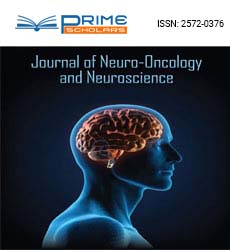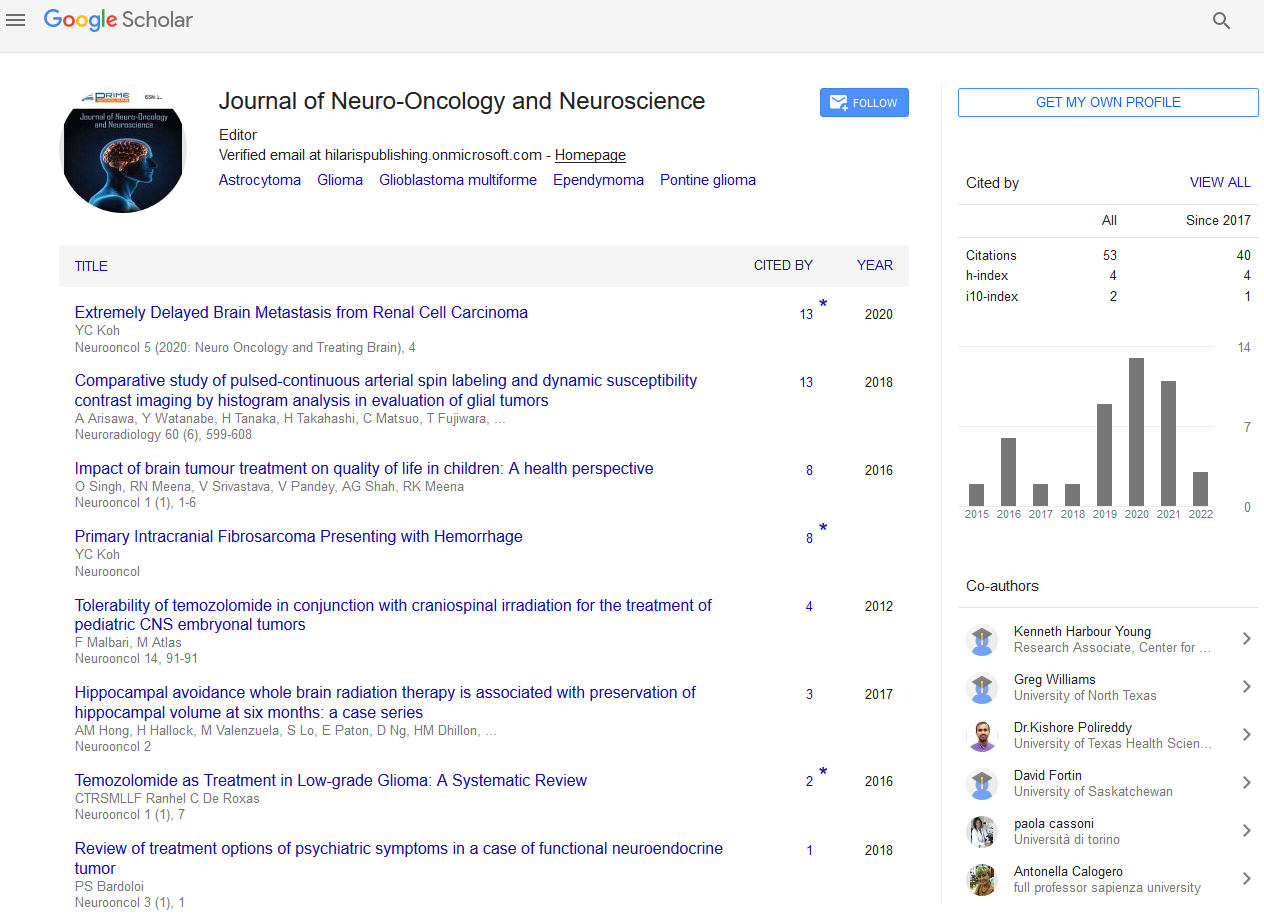Opinion Article - (2023) Volume 8, Issue 2
Unlocking the Mysteries of Astrocytoma: A Journey towards Hope
Robert Brown*
Department of Neurology, Erasmus MC Cancer Institute, Netherlands
*Correspondence:
Robert Brown,
Department of Neurology, Erasmus MC Cancer Institute,
Netherlands,
Email:
Received: 31-May-2023, Manuscript No. IPJNO-23-17972;
Editor assigned: 02-Jun-2023, Pre QC No. IPJNO-23-17972 (PQ);
Reviewed: 16-Jun-2023, QC No. IPJNO-23-17972;
Revised: 21-Jun-2023, Manuscript No. IPJNO-23-17972 (R);
Published:
28-Jun-2023, DOI: 10.21767/2572-0376.8.2.017
Introduction
When we think of the human brain, we envision a vast and
intricate network of neurons, firing signals that govern our
thoughts, emotions, and actions. But nestled within this complex
organ is a lesser-known player in the neurological drama:
The astrocyte. These star-shaped cells, often overshadowed by
their more famous counterparts, the neurons, have gained attention
for their role in a formidable adversary.
Description
Astrocytoma is a type of brain tumor that originates from astrocytes,
the glial cells responsible for providing support and
nourishment to neurons. These tumors can develop anywhere
in the brain or spinal cord, and they are classified into four
grades based on their aggressiveness, with Grade IV being the
most malignant. One of the most unsettling aspects of astrocytoma
is its silent intrusion. Symptoms can be subtle and easily
attributed to other causes, such as headaches, nausea, or
changes in personality. By the time a diagnosis is made, the
tumor may have already reached an advanced stage, making
treatment more challenging. Astrocytoma poses several challenges
to patients and healthcare providers alike. Treatment
options vary depending on the tumor’s location, grade, and
size, but typically include surgery, radiation therapy, and chemotherapy.
However, the effectiveness of these treatments
can be limited, especially for high-grade tumors, and they often
come with significant side effects.
One of the most exciting developments in the fight against astrocytoma
is the rise of precision medicine. This approach tailors
treatment to an individual’s unique genetic and molecular
profile, offering a more personalized and effective strategy. By
analyzing the genetic mutations and molecular characteristics
of each tumor, doctors can select therapies that are more likely
to target the specific vulnerabilities of the cancer cells while
sparing healthy brain tissue. This represents a significant shift
from the one-size-fits-all approach to cancer treatment and
holds the potential to revolutionize astrocytoma care.
While advancements in treatment are promising, early detection
remains paramount in the battle against astrocytoma.
Routine check-ups, awareness of symptoms, and regular brain
scans for high-risk individuals can significantly increase the
chances of diagnosing the tumor at an earlier, more manageable
stage. Creating awareness about astrocytoma is another
crucial step in this journey. Knowledge empowers individuals to
recognize symptoms, seek medical attention, and advocate for
their health. Public awareness campaigns, educational initiatives,
and patient support networks play a vital role in disseminating
information about this condition and reducing the stigma
associated with brain tumors. Research is the cornerstone
of progress in the fight against astrocytoma.
Conclusion
In conclusion, astrocytoma is a formidable adversary, but it
is not invincible. With advances in precision medicine, early
detection, and increased awareness, there is hope on the
horizon. The collective efforts of the medical community, researchers,
patients, and advocates are essential in this ongoing
battle. Let us rally behind the cause of astrocytoma awareness
and research, for it is through knowledge, innovation, and determination
that we will unlock the mysteries of this complex
disease and offer a brighter future to those affected by it. Together,
we can turn the tide in the fight against astrocytoma,
bringing hope to countless individuals and their families.
Citation: Brown R (2023) Unlocking the Mysteries of Astrocytoma: A Journey towards Hope. Neurooncol. 8:017.
Copyright: © 2023 Brown R. This is an open-access article distributed under the terms of the Creative Commons Attribution License, which permits unrestricted use, distribution, and reproduction in any medium, provided the original author and source are credited.

